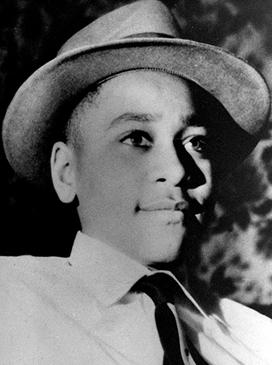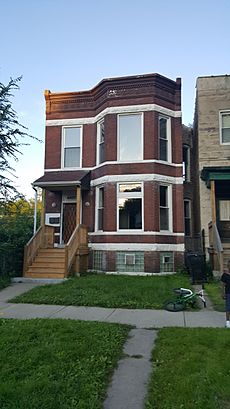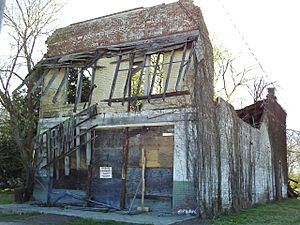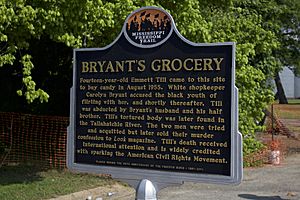Emmett Till facts for kids
Quick facts for kids
Emmett Till
|
|
|---|---|

Till in a photograph taken by his mother on Christmas Day 1954
|
|
| Born |
Emmett Louis Till
July 25, 1941 |
| Died | August 28, 1955 (aged 14) Money, Mississippi U.S.
|
| Cause of death | Homicide |
| Resting place | Burr Oak Cemetery |
| Education | James McCosh Elementary School |
| Parent(s) | Mamie Carthan Till-Mobley Louis Till |
Emmett Louis Till (July 25, 1941 – August 28, 1955) was a 14-year-old African American boy. He was killed in Mississippi on August 28, 1955. This happened after he was accused of acting disrespectfully towards a white woman, Carolyn Bryant. Emmett's death and the fact that his killers were found not guilty brought attention to the long history of unfair and violent treatment of African Americans in the United States. After his death, Emmett Till became an important symbol for the civil rights movement.
Contents
Emmett's Early Life
Emmett Till was born in 1941 in Chicago, Illinois. His mother was Mamie Carthan and his father was Louis Till. Emmett's mother, Mamie, was born in a small town called Webb in the Mississippi Delta. The Delta region is a large area in northwestern Mississippi.
Moving North
When Mamie was two years old, her family moved to Argo, Illinois, near Chicago. They were part of the Great Migration. This was when many Black families moved from the Southern United States to the North. They wanted to escape violence, find better opportunities, and get equal treatment under the law. Argo was even called "Little Mississippi" because so many people from the South moved there.
In the 1950s, Mississippi was the poorest state in the U.S. Black people there had very few chances to earn money. Many were sharecroppers, meaning they farmed land owned by white people. Black people were also largely stopped from voting and had no say in politics. Laws called Jim Crow laws kept Black and white people separate and unequal.
Life in Chicago
Mamie mostly raised Emmett with her mother. His parents separated in 1942. When Emmett was six, he got sick with polio. This illness made him have a stutter. To help with his speech, his mother taught him to whistle softly before he spoke.
Mamie and Emmett moved to Detroit for a short time. But Emmett preferred Chicago, so he went back to live with his grandmother. His mother later rejoined him there.
A Trip to Mississippi
In the summer of 1955, Emmett's great-uncle, Mose Wright, visited them in Chicago. Mose told Emmett stories about life in the Mississippi Delta. Emmett wanted to see it for himself. Mose Wright lived in Money, Mississippi, a small town with a few stores and a school.
Before Emmett left, his mother warned him that Chicago and Mississippi were very different. She told him he needed to know how to act around white people in the South. Emmett promised her he understood.
The Incident in Money, Mississippi
Emmett arrived in Money, Mississippi, on August 21, 1955. On August 24, he and his cousin went to Bryant's Grocery and Meat Market to buy candy. The store was owned by a white couple, Roy and Carolyn Bryant. Carolyn was alone in the front of the store that day.
What Happened at the Store?
What exactly happened inside the store is still debated. Some people say Emmett may have whistled at Carolyn Bryant. His cousin, Simeon Wright, who was with him, said Emmett did whistle. Simeon said Emmett might have been joking around. He also said it scared them because a Black boy whistling at a white woman in Mississippi was very dangerous.
Some newspaper reports later said Emmett sometimes whistled to help with his stutter. His mother said he had trouble saying words that started with "b," like "bubble gum." She taught him to whistle softly to help him speak more clearly.
Emmett's actions, perhaps without him knowing, went against the unwritten rules for Black males interacting with white females in the Jim Crow South.
The Abduction
A few nights after the incident at the store, Carolyn Bryant's husband, Roy, and his half-brother, J.W. Milam, came to Emmett's great-uncle's house. They were armed and took Emmett from the house. The men took the boy to a barn where he was killed.
The Trial and Its Impact
The trial for Emmett's death was held in Sumner. Many reporters from all over the country came to cover the trial. It was called "the first great media event of the civil rights movement."
The Verdict
Roy Bryant and J.W. Milam were found not guilty of Emmett's killing. They were not charged with taking him from the house.
Newspapers around the world, and religious and social publications, showed great anger about the verdict. They strongly criticized American society. However, Southern newspapers, especially in Mississippi, wrote that the court system had done its job. Emmett's story stayed in the news for weeks. It sparked debates about justice for Black people and whether Jim Crow laws were right.
Later Admissions and Legacy
A few months after the trial, Bryant and Milam openly admitted they had killed Emmett in an interview with Look magazine. They could not be tried again for the same crime. Neither man believed they had done anything wrong.
Their admission caused a huge reaction. Civil rights leaders pushed the U.S. government to investigate the case more. Emmett Till's death helped lead to the passing of the Civil Rights Act of 1957. This law allowed the U.S. Department of Justice to get involved in local law issues when people's civil rights were being harmed.
See also
 In Spanish: Emmett Till para niños
In Spanish: Emmett Till para niños
 | Emma Amos |
 | Edward Mitchell Bannister |
 | Larry D. Alexander |
 | Ernie Barnes |




